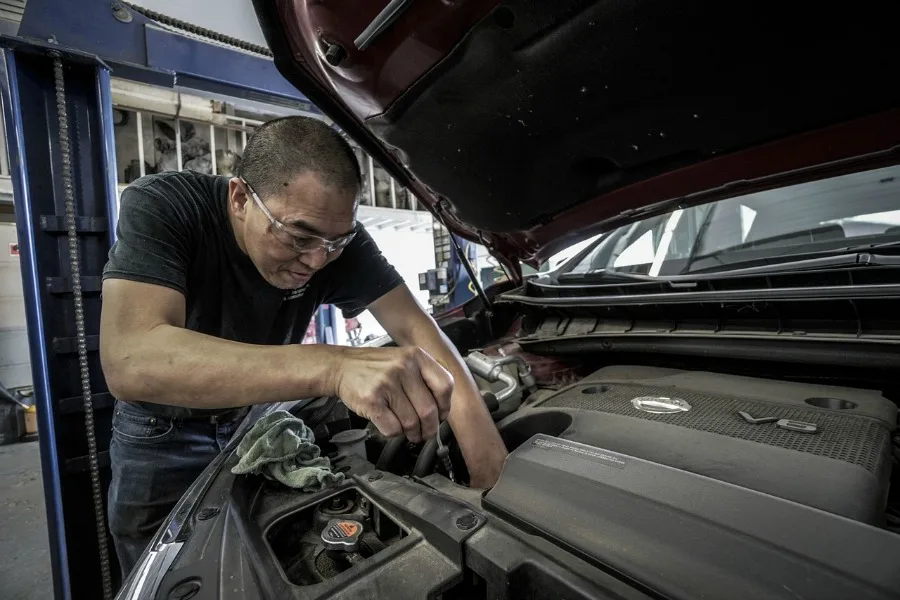Your car is so much more than just a vehicle to get you from one place to another, it’s an investment. And, depending on how long you’ve had it, it’s likely taken you on many adventures and seen you through numerous events. However, if your car has been in the shop more than your driveway lately, you are probably trying to decide whether to repair or replace your car.

Questions to Ask: Repair or Replace Your Car
There are a lot of considerations when it comes to deciding whether to repair or replace your car. For example, how good its fuel mileage is, its history of repairs, and whether or not there are any repairs that you can do yourself to save some money. Asking yourself the following questions can also help make the decision easier.
1 Is your car unsafe or unreliable?
The first thing you should consider is the safety and reliability of your vehicle. If you cannot get your car into a safe condition, or if you worry about your car breaking down on the road or not starting when you need it to, then it’s almost certainly time to replace it. Doing so could mean a safer, more reliable vehicle.
2 How much does your current car cost you per month?
Owning a car that is completely paid off is a huge plus, but you still need to take into consideration the monthly costs too. This includes how much you spend on gas, insurance, and general maintenance. To find your average monthly cost, simply add up a year’s worth of the above expenses and divide by 12.
Once you have your total, think about whether it is costing you more than payment on a new car would (see question number 5).
3 How much is your current vehicle worth?
When deciding whether to repair or replace your vehicle, you also need to consider is the current value of your car (without repairs). And that doesn’t mean just the actual physical value of it. You also need to consider the idea of how much it is worth to you to be free of a car payment and to not have to take public transportation or depend on others for a ride to get to work.
Free sites like Kelley Blue Book or Edmunds can help you determine the physical value of your vehicle. This will give you a general idea of what you could get for your car if you were to sell it or trade it in.
You also need to sit down and decide ahead of time how much you can afford to put into repairs.
A good rule of thumb to consider is that if the amount of the repairs plus the value of your damaged vehicle is less than the value of your vehicle once it’s fixed, then you may be better off selling it.
4 Does your car need an expensive repair?
Your next question to ask yourself is how much it will cost to repair your vehicle. In most cases, repairing your old car is almost always going to be cheaper than replacing it with a new one. However, there are a couple of exceptions to this rule:
- Depending on the make and model of your car, if there is serious damage to your engine or transmission, it could lead to a repair that costs as much as a used car.
- If your proposed one-time maintenance cost is more than half the current value of the vehicle (in working condition), it’s probably time to get a new vehicle.
Take your vehicle to a mechanic you trust in order to get a quote. If the cost is excessive, ask your mechanic if there’s a way to make it cheaper. For example, could the transmission be rebuilt instead of replaced? Could he use salvaged parts?
While there, it won’t hurt to ask if there other pricey repairs he thinks you’ll have to make in the near future to keep your car running. Take these into consideration as well.
5 Would your budget allow for a new vehicle?
Another question to ask yourself is whether or not you can afford a new car. If you were to replace your car, decide what make and model you would want. Research options and prices in order to get an idea of your monthly payment. Don’t forget to add in other related costs such as monthly fuel costs, car insurance, and interest rates if you will be financing a vehicle.
If buying a new or slightly used car would cause financial stress, it probably wiser to invest in the repair. On the other hand, if you’ve got the room in your budget to replace your car and cover all of the associated costs, then go for it!
Final Thoughts
Deciding whether to repair or replace your car is a very involved decision and one that only you can make. By asking yourself the above questions, you’ll be able to make the right decision for you. Whichever you decide, dealerships such as Winner Subaru can help you with repairs or finding a new car that’s right for you.
